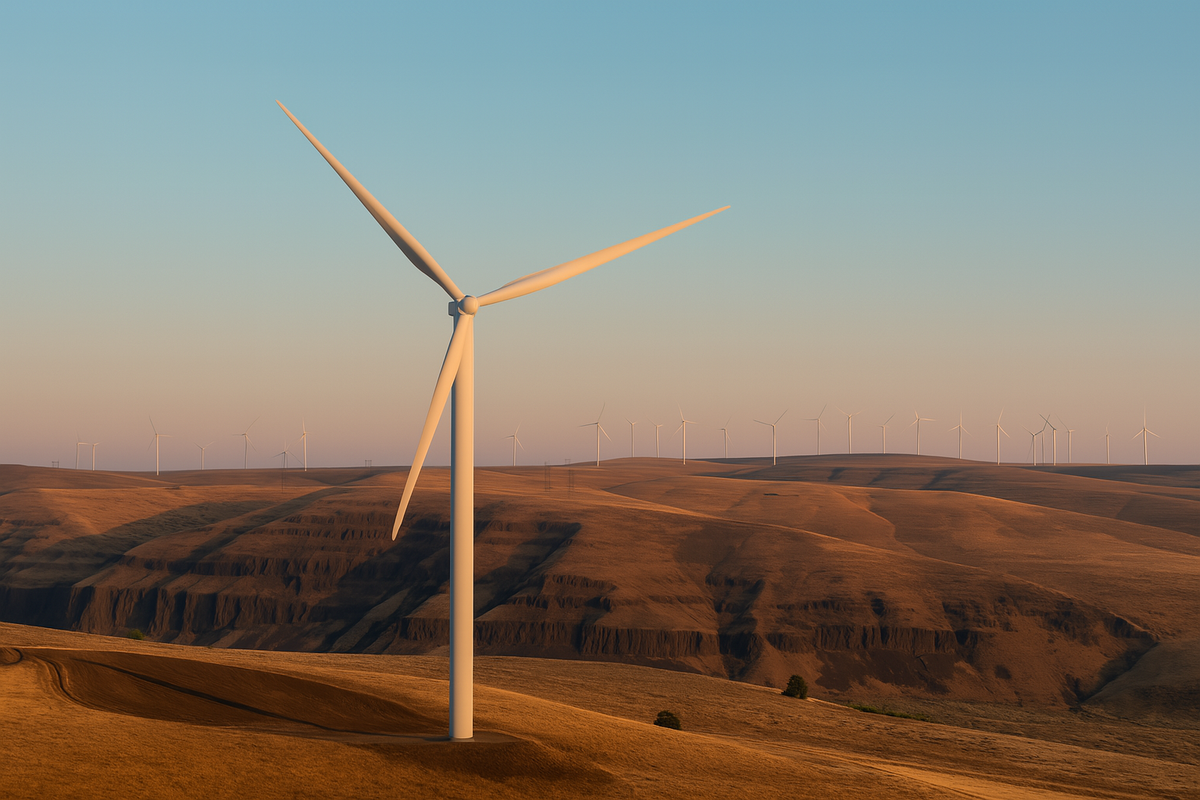He Said It Was About Energy Security. Then He Cut the Power to the Future.
Farmers in Lincoln and Columbia Counties were building a clean energy future — until H.R. 1 cut the legs out from under them. What Rep. Baumgartner voted for is already stalling projects and driving up rural energy costs.

Inside the Quiet Harm H.R. 1 Inflicted on Rural Washington
The Windmills of Rural Ambition
Along the ridgelines and wheat fields of Eastern Washington, wind turbines stand tall against the sky; testament to a region investing in its own future. In places like Columbia and Lincoln counties, they are more than infrastructure. They are income. They are hope. And they are under threat.
Alicia Zeiler stands beside her family’s wheat fields outside Harrington, Washington, watching the summer air move steadily above the hills. Her family had joined the Wheatland Wind Project, a proposed renewable energy development that would have installed dozens of utility-scale turbines, with long-term lease payments for participating farmers and new stability for the regional power grid.
“We’re just going to keep having demand,” she says. “But that’s not going to be possible if prices keep rising.”
The project had opened the door to a future where her family could electrify equipment over time, reduce diesel costs, and diversify income with clean energy. But with federal incentives now rolled back, the developers are reconsidering the economics.
“I’m more worried than before,” Zeiler says. “This is going to impact us-and our community.”
A Vote for Energy Security - or for something far less?
When Congress passed the “One Big Beautiful Bill” (H.R. 1) on July 3, 2025, national headlines focused on tax cuts and culture war posturing. But here in Eastern Washington, the betrayal landed with less noise-and more lasting damage.
H.R. 1 gutted key provisions of the Inflation Reduction Act, stripping tax credits and subsidies that had supported wind, solar, and battery investments in rural areas.
Farmers across Columbia, Lincoln, and Walla Walla counties now face the loss of $4,000 to $8,000 per turbine annually in land lease payments.
Local electric cooperatives warn of a 10–15% spike in electricity costs, especially in areas where solar and battery storage had just begun stabilizing rural grids.
Projects like Wheatland are now in limbo as developers reassess the math under H.R. 1.
According to regional analysts, WA‐5’s rural communities stand to lose millions in potential lease income, electricity savings, and long-term energy resilience. David Funk, who works with over 100 regional wind leaseholders through Zero Emissions Northwest, put it plainly:
“It’s just absolutely the wrong policy …”
The Real Damage is Local
Rep. Michael Baumgartner, WA‐5’s freshman congressman, was quick to back the Northwest Energy Security Act, a bill to lock in operations at the Lower Snake River dams and block reforms.
He co-sponsored the measure and praised it for defending “reliable, affordable” hydropower. However, critics argue the increasing costs to operate the dams are not sustainable.
But just weeks after putting his name on the dams’ legislation, Baumgartner voted for H.R. 1, the draconian tax cut bill that effectively kneecaps the next generation of rural power: wind, solar, battery, and grid modernization.
Despite the loss to the local economy and the devastating blow to Eastern Washington’s clean energy infrastructure, Baumgartner describes Trump’s signature bill as “a bold, serious step toward getting our economy back on track and restoring real accountability.”
He never once mentioned energy or the impact here at home.
What he also failed to mention about H.R. 1 is that it mirrors the ideological blueprint of Project 2025, the right-wing transition plan that includes specific language calling for the dismantling of the very offices helping rural communities invest in clean energy.
“Congress should eliminate the Office of Energy Efficiency and Renewable Energy,” the plan states, “whose mission has evolved into pushing technologies that align with the progressive climate agenda.” (Project 2025, p. 474)
H.R.1’s attack on clean energy wasn’t about budget reform. Project 2025’s explicit reference to ‘the progressive climate agenda’ establishes its motive as an ideological purge. And Baumgartner voted for it, just as he has backed numerous other initiatives laid out in the extreme conservative policy manual.
Baumgartner claims to defend energy security while voting to cut its future.
This Isn't a Policy Disagreement. It's the Sabotage of Local Progress
Rural Washington wasn’t looking for a handout. It was building something-slowly, responsibly, and in sync with the land. Farmers like Lincoln County’s Alicia Zeiler were investing in wind. Electric cooperatives were testing battery banks to stabilize rural grids. And WSU students were piloting agri-solar projects that combined food production with clean energy-all part of a grassroots push toward resilience.
Now, much of that momentum has stalled. Some of it may never resume.
“I’m more worried than before that the bill … will impact us and our community …” - Alice Zeiler
The wind still moves across the plateau-but the promise it carried has been stilled. For families, farmers, and the rural grid, the future isn’t just delayed. It’s being abandoned.
